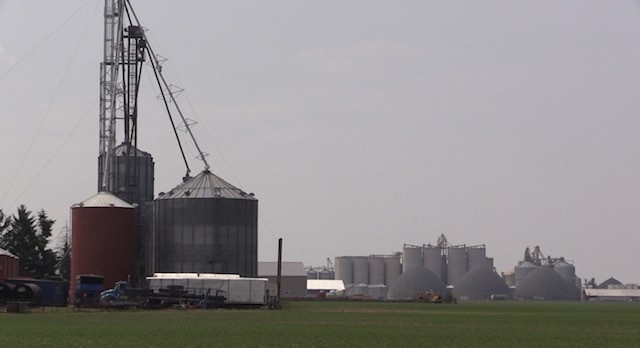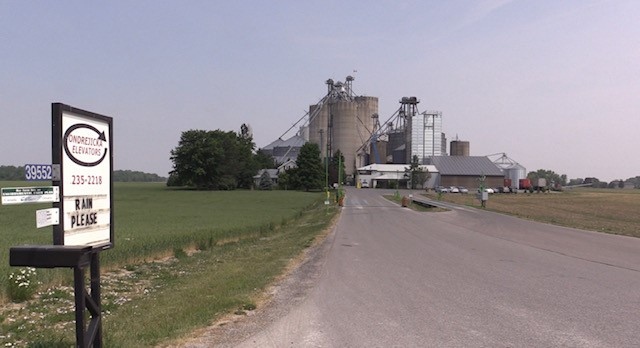Commercial grain dryers cry foul over lack of carbon tax exemption
Not only is Mike Ondrejicka praying for rain, he’s hoping for a miracle when it comes to a piece of legislation that exempts Canadian farmers from paying the carbon tax on grain drying.
“It’s a great thing. It’s a good thing for farmers, in theory. The problem is, the carbon tax exemption doesn’t apply to commercial elevators that dry farmer’s corn,” he said from his Exeter, Ont. area operation.
Ondrejicka said Ontario’s 300 commercial grain elevators dry approximately 60 per cent of Ontario’s corn, beans and grains. So a private member’s bill that exempts farmers from paying carbon tax on the natural gas and propane they use to dry those crops doesn’t help as many producers as expected.
“For us, it’s hundreds of thousands of dollars. It’s a significant cost that we have to pass on. We cannot absorb that amount, and the carbon tax continues to escalate until it peaks in 2030,” said Ondrejicka.
The MP who formed the private member’s bill, Bill C-234, is Ben Lobb from the riding of Huron-Bruce. He said he would have loved to have added an exemption for commercial grain drying elevators to the bill, but he was assured he wouldn’t have the support from the NDP, Liberals, and Bloc Québécois he needed to get the bill through Parliament.
 A private member’s bill exempts the cost of the carbon tax for on-farm grain drying from natural gas and propane, but does not include an exemption for commercial grain drying elevators, where 60 per cent of Ontario’s grain is dried for market-near. (Scott Miller/CTV News London)
A private member’s bill exempts the cost of the carbon tax for on-farm grain drying from natural gas and propane, but does not include an exemption for commercial grain drying elevators, where 60 per cent of Ontario’s grain is dried for market-near. (Scott Miller/CTV News London)
“If we could have had support from all the political parties, we could have pushed it through all three stages in one shot and sent it to the Senate, and everybody would have been happy. Unfortunately, we didn’t have any support from the other parties,” said Lobb.
Ondrejicka feels he’s doing his part to help curb his company’s carbon footprint, with solar roof panels, a new energy efficient dryer and electric vehicles, so not getting the carbon tax exemption to dry the same corn being dried at the next farm stings.
“It’s not really right when a government tax gives someone an advantage over somebody else. In essence, we’re doing exactly the same job as the farmer is, but we’re being forced to pay carbon tax,” he said.
 A private member’s bill exempts the cost of the carbon tax for on-farm grain drying from natural gas and propane, but does not include an exemption for commercial grain drying elevators, where 60 per cent of Ontario’s grain is dried for market-near. (Scott Miller/CTV News London)
A private member’s bill exempts the cost of the carbon tax for on-farm grain drying from natural gas and propane, but does not include an exemption for commercial grain drying elevators, where 60 per cent of Ontario’s grain is dried for market-near. (Scott Miller/CTV News London)
“If Pierre Polievre was ever prime minister, the carbon tax would gone, and the whole discussion would be moot. I understand the grain dryer’s issue, and I’ve always been open and up front about the issue. We’re trying to support Canadians and Canadian farmers in the quest to produce world class food,” said Lobb.
Lobb’s private member’s bill isn’t law yet, and it’s currently at its second reading in the Senate. Lobb hopes to see a final vote on his bill in the next six months.
CTVNews.ca Top Stories

Settlement reached in complaint over Canada Post layoffs as strike hits four weeks
The union representing Canada Post workers says an unfair labour practice complaint over the company's layoffs has been resolved.
Rescue group saves 11-year-old girl floating alone in the Mediterranean for days after shipwreck
An 11-year-old girl from Sierra Leone was found floating in the Mediterranean Sea off Italy's southernmost island of Lampedusa, believed to be the only survivor of a shipwrecked migrant boat that had departed from the port of Sfax in Tunisia, a humanitarian group said Thursday.
Banks tell 2 Ontarians too much time has passed to cash decades-old cheque, GIC
Two Ontarians who recently found unclaimed money from decades-old investments were told by their banks there were no records of them in their systems.
She took a DNA test for fun. Police used it to charge her grandmother with murder in a cold case
According to court documents, detectives reopened the cold case in 2017 and then worked with a forensics company to extract DNA from Baby Garnet's partial femur, before sending the results to Identifinders International.
Ontario Premier Doug Ford threatens to cut off energy to U.S. in response to Trump's tariffs
Ontario Premier Doug Ford has threatened to cut off energy supply to the U.S. in response to the tariffs President-elect Donald Trump plans to impose on all Canadian imports.
'We are in for more terrorism, not less,' warns Canadian terror expert amid Syria's political chaos
The collapse of Bashar al-Assad’s regime means the ticking time bomb of prisons holding thousands of suspected ISIS members in northeast Syria has become even more unstable, a Canadian terrorism expert warns.
Missing 'lost Canadians' deadline creates 'unknowable' number of new citizens: feds
The federal government is asking an Ontario Superior Court for more time to pass citizenship legislation for the "lost Canadians," saying that without an extension an "unknowable" number of people would automatically become citizens next week.
Stressed about the cost of the holidays? How to talk to loved ones about cutting back
Experts say it's common to be stressed about money around the holidays, but talking to friends and family about your budget — and maybe even agreeing to financial caps on gift-giving — can remove a lot of anxiety from the holiday season.
Elon Musk calls Justin Trudeau 'insufferable tool' in new social media post
Billionaire Elon Musk is calling Prime Minister Justin Trudeau 'an insufferable tool' in a new social media post on Wednesday. 'Won't be in power for much longer,' Musk also wrote about the prime minister on 'X.'

































